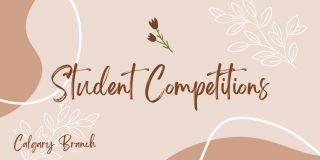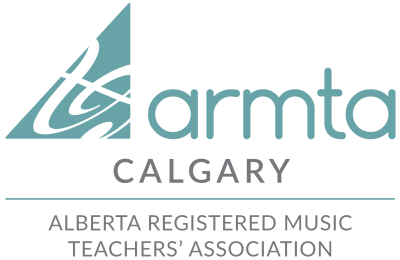
Endowment Society of the Calgary Registered Music Teachers
Announces our Second Annual Story Competition!
Deadline: Sunday, April 5, 2026 @ 11:59 pm
Limber up your fingers and grab a notebook or head to your computer!
Contest Description
Students of ARMTA Calgary teachers are invited to create a fictional short story written about a piece of music or speech arts that they are studying or have recently studied. The entries submitted will be categorized in one of three age groups based on the students’ grade in school
(not the grade level of their ARMTA discipline): Grades 0 – 4 Grades 5 – 8 Grades 9 – 12
* Each age category has three prizes available!
School Grades 0 – 4
First place: $70
Second place: $60
Third place: $50
School Grades 5 – 8
First place: $100
Second place: $90
Third place: $80
School Grades 9 – 12
First place: $130
Second place: $120
Third place: $110
We will also hold $40 random draws
* In an effort to award maximum prizes, we reserve the right to re-categorize the age brackets if there is a shortage of applicants in one category.
General Rules and Regulations

Entry requires:
1) An online application form
2) Upload of signed consent form (must be signed by parent or guardian if the student is under 18)
3) Upload of student’s story
4) Upload of a picture from the author (student)
5) Upload of short author biography
6) Students must be studying with an ARMTA Calgary member in good standing at the time of submission
7) Category is determined by the student’s grade in school as of the entry deadline
8) Only one submission per student per competition
9) All entries are expected to be in good taste and inappropriate, obscene or occultist work will be disqualified
Please read and follow all guidelines carefully
To be eligible for a prize, stories must meet these guidelines:
(see additional guidelines below according to school grade category)
- Stories must be original and written solely from the student’s imagination.
- The story must represent a piece of music or speech arts selection that the student is studying, which is specified on the application form.
- Stories must titled.
- The title of the story and the author’s name (student) must appear at the top of the first page.
- Stories must have a clear beginning, middle and end.
- Stories must contain the basic elements of writing indicated in the student’s grade category (see below).
- The title and composer of the selected piece of music or speech arts must be incorporated into the story
- Stories must contain a minimum of two music or speech arts terminology. Terms must be used correctly (the meaning must not be changed or fictionalized).

Additional Guidelines for School Grades 0-4
- Stories may be typed (1/2 page) or handwritten (1 full page).
- Typed stories are encouraged for students who are able. Font: Times New Roman 11-point type with 1-inch margins.
- Stories must begin with a title and the author’s name (student’s name) Font: Arial 12-point type
- Stories must contain these four basic elements of writing (scroll down for literary meanings):
1) point of view
2) character(s)
3) setting
4) plot
Acceptable file types:
for typed stories: doc, docx and pdf
for handwritten stories: doc, docx, pdf, jpg, jpeg, png, gif, tif (typed stories preferred)
Additional Guidelines for School Grades 5-12
- Grades 5 – 8 (1 full page)
Grades 9 – 12 (2 full pages) - Stories must begin with a title and the author’s name (student’s name) in Arial 12-point type
- Stories must be typed single-spaced in Times New Roman 11-point type with 1-inch margins.
- Stories must contain these six basic elements of writing (scroll down for literary meanings):
1) point of view
(use either First Person, Third Person Limited or Third Person Omniscient)
2) character(s)
3) setting
4) plot
5) theme
6) climax
Acceptable file types: doc, docx and pdf
Winners will be published in Impromptu and a print copy will be mailed to them!
All entries require a *picture and a brief description of the author.
Winners' stories, pictures, and bios will be published in our Impromptu newsletter and all or a portion may be published on our website.
Deadline: Sunday, April 5, 2026 @ 11:59 pm
Winners will be notified by the 17th of May
Literary Meanings
** Point of View The perspective from which the story is told
Characters People, or even animals, who take part in the action of the story.
Setting The time and place in which the story happens.
Plot A series of events and actions that relate to the story.
Theme The central idea or main lesson to learn from the story.
Climax The primary turning point (what the story has been building towards)
** Points of View Acceptable for this Competition
First Person The narrator tells the story from the main character’s perspective, using the pronoun ‘I,’.
Third Person Limited The narrator tells the story from one character’s perspective at a time, using the pronouns he, she, and they to describe their thoughts and actions.
Third Person Omniscient The narrator knows all the thoughts, actions, and feelings of all the characters
Stories will be judged on
(but not limited to)
the following elements:
1. Spelling, punctuation and grammar
2. Beginning: the story draws the reader in
3. Narrative arc: Introduction, rising action, climax, falling action, resolution
4. Conflict / resolution
5. Protagonist / antagonist
6. Ending: the story feels polished and complete
7. Maintain consistent point of view
8. How well was the setting developed
9. Characterization
10. Creativity
Questions? Contact the Administrator
